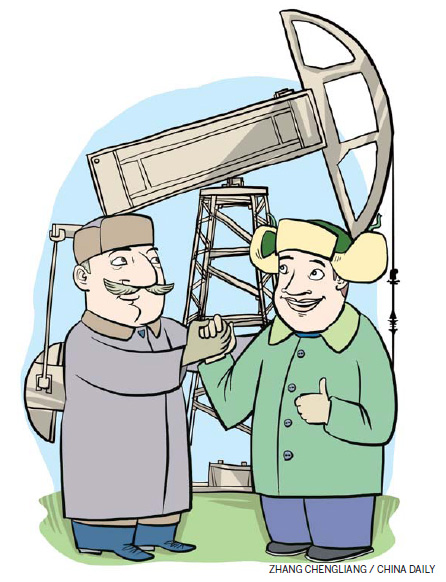
When the Russian Prime Minister, Vladimir Putin, ended his two-day visit to China two weeks ago, media in China and Russia regretted that the two countries failed to sign the Sino-Russian gas cooperation agreement. But what it shows is that the relationship between the two is maturing, and that cooperation between the two is closer to what might be regarded acceptable international standards.
Under the Sino-Russian gas cooperation agreement Russia would transport 30 billion cubic meters of natural gas from West Siberia to China and 38 billion cubic meters from East Siberia each year. Russia is selling gas to Germany at $400 (288 euros) per thousand cubic meters. Even if Russia settled on a lower price with China, $350, Russia would still be expected to haul in revenue of $23.8 billion a year. If the pipeline can run for 30 years, that would bring in revenue totaling $714 billion.
However, if you use as a guide the long-term agreed purchase price that China gets in the current international liquefied natural gas (LNG) market and the cost of China's unconventional natural gas exploration, buying oil from Russia even at just $250 per thousand cubic meters makes no sense.
To get gas from West Siberia to the Chinese border port of Altai, Xinjiang Uygur autonomous region, it must travel 2,500 kilometers; for it to get from there to economically developed areas such as Shanghai and Guangdong province it needs to travel another 5,000 kilometers. Such huge transport logistics exist nowhere else. So even if the price was $250 per thousand cubic meters, it would still be too high.
The deal is fundamentally flawed, and it is little surprise that the two sides cannot reach an agreement. On gas prices, neither Russia not China can give in. If Russia gives China a lower price, how can it face consumers in Europe? If China accepts a price increase, how would it deal with other natural gas suppliers, particularly Turkmenistan and other Central Asian countries?
The US is changing the world through a quiet revolution, one that involves shale gas. The US consulting firm Cambridge Energy believes that the world is very rich in unconventional natural gas, which can change the rules of the game. The game rules talked of are not just to do with natural gas and energy. They may affect the game rules of the entire world geopolitical pattern. "Unconventional gas" refers mainly to shale gas, coal bed methane, tight sands gas and gas hydrates.
In recent years shale gas extraction and supply in the US have increased rapidly, and gas prices continue to decline, spurring competition with conventional natural gas. The output was 137.9 billion cubic meters last year, accounting for 23 percent of total gas production in the US. That reduced expected imports of LNG by 100 million tons. The US does not need to increase natural gas imports; indeed it has started exporting LNG, and the much vaunted "energy independence" is becoming a reality.
Advances in US unconventional natural gas technology directly affect the world's natural gas supply and demand. Many LNG projects worldwide, which had been oriented to the US market, are looking for new markets, and the prices are falling. In particular, a new round of global economic recession has made companies realize that the world economic crisis will not disappear any time soon. How long it will last is difficult to gauge, but now only a few countries such as China and India can continue to be active in the natural gas market.
Russia's desire to sell natural gas to China is born of market pressure. Over the years Russia has treated the resource as a tool to maintain its national strategic interests. It has frequently interrupted gas supply to make its voice heard, making European countries that import the gas feel vulnerable. Gaining energy independence from Russia has become the national energy strategy of such countries. In September Turkey threatened to terminate its gas contract with Russia if the price was not reduced.
With the end of the war in Iraq, the country's oil and gas production capacity is now on tap. Turkey aims to take over the havoc-ridden Egypt as the new leader of that part of the world. This requires Turkey to open more markets to the Arab world and increase energy purchases from the Arab states. The use of cheaper natural gas from Iraq is not only economical, but is also helping ease the security pressure on the Turkey-Iraq border.